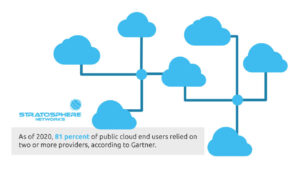
A strategy that involves leveraging multiple public clouds – a.k.a., a multi-cloud approach – has become the most common method in cloud computing: Gartner reported in 2020 that 81 percent of public cloud users relied on two or more suppliers.
However, as with any IT strategy or solution, it’s also crucial to consider the potential drawbacks before you move forward with a multi-cloud deployment. If your business hasn’t already hopped on the multi-cloud wagon, here’s some essential information to help you make a well-informed decision about the direction your organization should take in terms of cloud computing.
Multi-cloud vs. hybrid cloud
Before we review the pros and cons of multi-cloud, it’s essential to clear up any confusion about this kind of cloud approach versus a hybrid cloud strategy. Although they sound similar and can overlap, there’s a difference between these two methods, according to VMware.
- Multi-cloud involves implementing more than one public cloud solution, typically from different suppliers. VMware gives an example of hosting Exchange servers on Microsoft Azure while hosting a web front-end app on AWS.
- Hybrid cloud combines public and private clouds, which are integrated and often managed as one. An example would be running an app in an on-prem private cloud and “cloud bursting” to a public cloud solution in instances where the on-prem cloud can’t handle the demand.
Multi-cloud and hybrid can also overlap when an organization utilizes private cloud infrastructure along with multiple public clouds.
Benefits of multi-cloud
Relying on more than one cloud service and provider has become the norm for numerous reasons. Notable multi-cloud benefits include the following, according to VMware, Cloudflare, and TechTarget.
- Increased redundancy: If you’re using more than one public cloud for the same function, you have a backup if one of them goes down.
- Lower costs: Multi-cloud can potentially lead to savings as it gives you greater leverage to apply competitive pressure and negotiate lower rates from suppliers.
- Vendor lock-in avoidance: Investing in a single cloud supplier can make it challenging to switch later due to the high cost and labor involved. Distributing workloads across more than one cloud can save your business from getting locked in with one provider.
- Better alignment among workloads and cloud services: Contracting with more than one cloud supplier means you can optimize performance by selecting the option that makes the most sense for each application or workload.
Multi-cloud drawbacks
Although the list of benefits might sound appealing, don’t make a decision about multi-cloud without first mulling over the possible disadvantages associated with the strategy. Here are some challenges Cloudflare and TechTarget caution you could run into with a multi-cloud environment.
- More complicated cybersecurity: You can end up juggling as many security configurations as there are clouds, making it more challenging to safeguard sensitive data. More than one cloud also means a larger attack surface and more potential vulnerabilities.
- Performance issues: Depending on the location of the suppliers’ data centers, you might have trouble balancing loads across multiple clouds.
- Increased management difficulty: You’ll need to manage more providers and find a way to achieve and maintain visibility into the data and processes of all the clouds involved.
Overall, whether multi-cloud makes sense for your business is highly dependent on your specific situation, including your current cloud usage, workloads, and cybersecurity and compliance needs, among other factors.
For additional information about multi-cloud and finding the best cloud solutions for your company, reach out to us to connect with our trusted technology advisors. We have extensive experience working with various cloud suppliers and can leverage our partner network and advanced tools to rapidly identify the best choices for your business based on objective comparison matrices and your current and anticipated requirements.
Get started today by calling 877-599-3999 or emailing sales@stratospherenetworks.com to schedule a cloud consultation.



